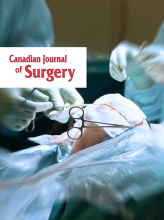The study by Kaspar and colleagues of surgeons’ attitudes to intra-articular steroid hip injection, which is published in this issue of the Canadian Journal of Surgery (page 461),1 is worthy of consideration by all surgeons, not just orthopedic surgeons with an interest in hip arthritis.
This paper addresses the need to obtain and analyze the opinions of surgeons who are members of a subspecialty and often base their treatment efforts upon what they feel rather than on the results of the clinical trials that they may have participated in or read about. The use of intra-articular steroids for both osteoarthritis and rheumatoid hip arthritis has been controversial but still continues; this is also the case for many other procedures in other surgical disciplines. How are we to determine what is good for patients and whether a clinical question is worthy of the effort of initiating and running a clinical trial?
The paper by Kaspar and colleagues offers some indications. The first is that the target responders of any study should be chosen with care. It is clear that the authors went to great lengths to make sure that the surgeons most likely to use the technique were the ones who were offered the chance to respond.
The second indication is to make sure that the questionnaire is both relevant and easy to answer. A response rate of 73% demonstrates that the questions were such that there was not a high responder burden; the questions were logical and aimed at the practising surgeon, a consequence of using a pilot group to test the questionnaire.
The third indication is to ensure that both positive and negative outcomes of the intervention are identified and graded; the fact that more experienced surgeons would NOT be unhappy if this treatment technique were not to be available suggests that its utility is limited and that younger surgeons should pause before using it indiscriminately. It is clear that surgeons, like many doctors, will use a treatment option even if they do not hold out much chance of benefit to the patient: this is seen in the statistic that of the 82% who use the technique, only 56% thought it was useful.
The fourth and last indication is to recognize the existence of an alternative treatment that is not the subject of the questionnaire. In this case, the authors did not probe to see what other treatment options had been or would be used before or after this particular one had been used and found wanting. The management of patients on a wait list may be making surgeons more likely to experiment with alternative treatment plans because the chosen operative treatment is delayed for reasons that have been well discussed in these pages in the past and no doubt will be in the future! In this situation, it is important that if the authors of a study feel that a future clinical trial may be initiated on the basis of a questionnaire, then the data from the questionnaire have to be clear in identifying at what point in the continuum of care the treatment in question is being used.
Having been both a respondent to questionnaires and an initiator of questionnaires, I have come to realize that we have to prevent the profession from falling into the same trap that telephone pollsters encounter: the absolute refusal to participate and the inappropriate responder who has no interest in the subject but whose name appeared on a list.
Kaspar and colleagues have advanced the understanding of questionnaires by bringing a more rigorous approach to the subject. We will continue to benefit from having our opinions identified and presented in a manner that allows for serious thought and future scientific analysis. We must make sure that we do not abandon this method of expressing our feelings about different treatments.
Footnotes
Competing interests: None declared.
- Accepted October 28, 2005.









